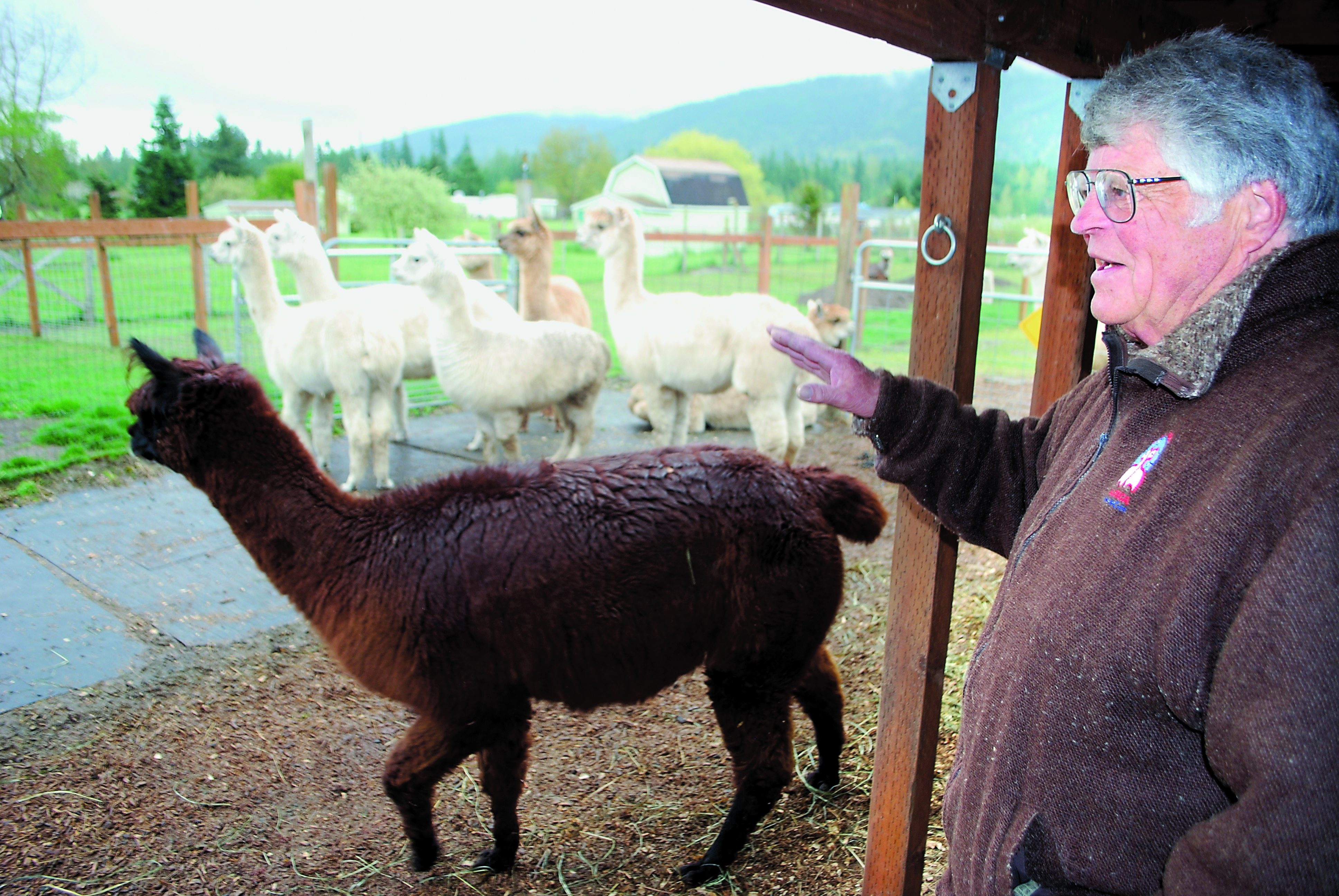HAPPY VALLEY — Mike and Linda Gooch like to think of their 17 alpacas as happy animals that produce a fine, soft fiber that can be spun and then knitted or woven into fine garments.
The Gooches have called the Happy Valley Alpaca Ranch home for 22 years but became interested in breeding alpacas only a little more than 14 years ago.
That’s when they read a Sunset magazine article about the long-necked animals that can grow up to 150 pounds and that provide a superior fleece that never scratches when worn.
The Gooches will host “Alpaca Education Days” at the ranch at 4629 Happy Valley Road from 10 a.m. to 4 p.m. June 9 to show how the fleece is sheared from the animals, then skirted and sorted by color.
Ken and Chickie Hiyoshida of Trade Winds Alpacas of Agnew will participate.
“We work really closely with them,” Chickie said.
Others will demonstrate the stages of creating garments and other products, from washing to carding to spinning, knitting, weaving, felting and dyeing.
The Gooches have found that lavender washes of alpaca fiber act as a moth repellent.
In addition to everything alpaca, Cathy Lucero of Clallam County WSU Co-op Extension’s noxious-weed control program will be there to identify weeds brought in to her.
Pasture management and rotation and even how to compost alpaca manure, which the Gooches sell by the truckload, will be taught.
The event will be free and open to the public, and is sponsored by Pacas of the Olympic Peninsula, or POOP, a group formed on the Peninsula last fall.
The name always elicits a chuckle, said Chickie, who started the group as a loosely knit collection of people who have or want alpacas — whether as ranch animals or pets — to help each other with veterinarian referral, feed or other questions.
“We’re not collecting dues. We have no bylaws, just a mission statement,” Chickie said.
Added Linda: “We’re here to help whoever needs it.”
Chickie said the name was mostly a joke she threw in at the group’s first meeting.
The members voted it in.
And it seems to be memorable, Chickie said.
“People all over now are asking how POOP is doing,” she said, adding that there are about dozen members now.
She and her husband moved to the area about seven years and started the alpaca ranch about six years ago.
The Gooches started out with two llamas but soon learned there was a bigger market for fiber from alpacas, which are native to South America and were only brought to the U.S. beginning in the late 1980s.
Alpacas come from the level heights of the Andes mountains of southern Peru, northern Bolivia, Ecuador and northern Chile, and graze in herds at altitudes between 11,500 and 16,000 feet.
Alpaca fiber is finer than llamas’, Mike said.
“The difference between llamas and alpacas is like the difference between a Volkswagen and a Cadillac,” he said inside the barn where the animals can be sheltered when they aren’t grazing in the corral outside.
The barn also adjoins the ranch’s gift shop that Mike, a carpenter most of his life, built and refined.
The small shop is filled with alpaca fleece garments that include Sequim weaver Anne Olson’s works of wearable art in natural colors.
Olson spins alpaca fiber by hand and knits and weaves the yarn into hats, sweaters, socks, mittens, shawls and blankets, among other fine garments.
She’s been spinning yarn and knitting for about 30 years, most recently for the Gooches over the past year and a half.
She said she loves working with alpaca fiber.
“The thing that’s wonderful about it is it doesn’t have an itch at all,” she said.
Mike has worn a jacket made from alpaca, the ranch’s logo embossed on it, for seven years in all kinds of bone-chilling weather.
The jacket, he said, breathes in the summer and holds in warmth during the coldest days of winter.
“I wanted to make local products,” said Linda, who is selling off imported products to make way for local-grown inside the shop.
“I’m making room for local people. We wanted to make it a cooperative from the beginning.”
The ranch is open to free tours by appointment at 360-681-0948.
“We’ve had people from up to 17 countries visit us,” said Mike, who has long been a Sequim-area home builder and carpenter.
They come from as far away as South Africa, Russia, France, Nova Scotia, even Tibet, he said.
The ranch store saw 903 visitors in 2010, but visitors fell off 50 percent in 2011, while sales increased 16 percent, Mike said.
“People want more handmade items,” he said, explaining why sales rose.
“They want something they’ve met and petted.”
Linda said they are constantly looking to find new uses for alpaca fiber, which remains soft for only about six years.
The coarser fiber from the older alpacas can be used as filler for comforters.
They learned the coarser fiber also is good for rugs and wall hangings.
“This is quite the evolution from golf sweaters,” Linda said as she recalled seeing them made from alpaca and on Seattle department store shelves in the 1960s.
The Gooches breed and sell alpacas, but market demand has fallen off dramatically with the economic downturn.
That’s why they have opted to sell more alpaca apparel as retailers.
________
Sequim-Dungeness Valley Editor Jeff Chew can be reached at 360-681-2390 or at jeff.chew@peninsuladailynews.com.
Managing Editor/News Leah Leach contributed to this report.

